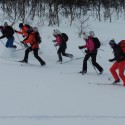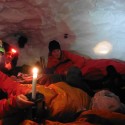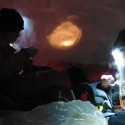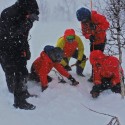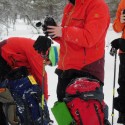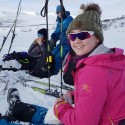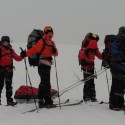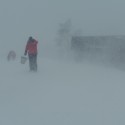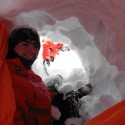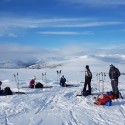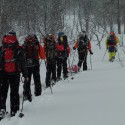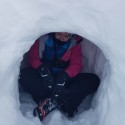Canford School CCF has been embarking for a number of years on a cross-country skiing expedition to Norway on what is described by all who go, as the toughest and the best trip the School offers. This year saw another twenty cadets, a fifth of our year 10s aged 14 to 15, challenging themselves in an alien environment, learning a completely new skill and then testing themselves, often to the limit, physically and mentally, on a three day ski-touring expedition. In order to increase the numbers benefitting from this outstanding experience, a further ten cadets from Wellington College CCF were invited to join the group. The life skills learned and personal challenges overcome are all enormously beneficial to each individuals’ long term education, whilst the experience itself will live long in their memories. The expedition is not selective and the weakest applicants invariably learn the most and benefit hugely.
So on Saturday 10th February thirty-one cadets, four staff and six instructors arrived in Hovden just southwest of the Hardangervidda, known for the wartime tales of the Telemark Heroes and their destruction of the German Heavy Water Nuclear programme, to taste this new experience and test themselves to the limit. There, we quickly broke into random groups and got down to the first three days of learning about the technicalities of waxing skis, using skins on the steep uphill sections and perfecting the glide of cross-country skiing, whilst developing an awareness of the risks and threats faced in a freezing environment. Packing for the expedition on the third built the excitement further as the cadets prepared mentally and physically for the main expedition itself. Most were nervous, many were unsure of how they would react under the pressure and none wanted to fail or let their colleagues down.
Finally, Wednesday 14th February arrived and six groups of cadets skied off into the Norwegian outback, each dragging a pulk with extra equipment, aiming to be safely tucked up by nightfall in their snowholes. Half the party, gradually gaining altitude whilst climbing clear of the tree-line and entering the vast spectacular snowfields frequented by reindeer and ptarmigan made excellent progress, but not without some trepidation given the physical challenge and the unknown. It was not long however, before they began to experience rapidly deteriorating weather and on arrival at the Tjornbrotsbu Hut the winds grew viciously whilst the visibility dropped and heavy snow began to fall. One cadet commented; “The hardest thing I did was definitely the first day of the expedition when we skied hard uphill for 15 km. For the last 2 km we had no visibility and trouble finding the hut. On top of this, the skins kept falling off and we were really cold and tired. However as a team with our instructors we completed the ski and learned so much.” In the event the snowholes became physically impossible to build and the cadets were forced to retire to the adjacent Norwegian National Trust Hut.
The other group however were more successful: one cadet takes up the story; “After a tough ski into the hills through new deep snow dragging our pulk we constructed our quincy, an igloo built by making a huge mound of snow and hollowing it out from the inside. For me this was my favourite day because everyone took part and we really felt like we accomplished something. After building our huge snow hole, in which the very tall Mr Culley could stand up in, we settled down for the night in our sleeping bags: but not before cooking and enjoying our rations which were basically no more than sloppy cardboard. The night was surprisingly warm and quiet in the snowhole and after a comfortable sleep we packed up. On looking outside next morning however, we were confronted by a crazy blizzard and could barely scramble the fifty metres to the cabin where we took refuge for the morning. Sadly we could not move to our next point of the expedition, but managed an hour outside doing some first aid and rescue cum avalanche training with our transceivers. We all enjoyed the exercises because we had a chance to see what it would be like when dealing with people stuck in cold, windy and snowy conditions. It was fun but it did show us how terrifying it would be to be stuck in an avalanche as well. Then we got back into our cabin, played some cards and sorted all of our equipment for our next night in a warm wood hut”.
With no prospect of being able to ski further on day two everyone was indeed confined to the huts whilst the instructors generated a few scenarios to take advantage of the conditions and the time. The challenge of working as a team in poor visibility, with a severe wind chill, and in winds that were difficult to stand up in let alone achieve various tasks was fantastic and saw the cadets rising to the occasion and learning key skills in a team environment trying to rescue dummy victims and lost equipment in the snow. The wind continued to blow into the second night but died the next day offering all of us a superb ski out in soft snow, mostly downhill and back to a huge and very welcome bowl of soup.
Overall, despite the loss of effectively half of the expedition and the value that that brings in terms of challenging cadets under increasingly difficult conditions as they tired, they still took a huge amount away from the trip as an experience and importantly as an education. It was undoubtedly a huge success once again and the cadets and staff would like to take this opportunity to offer our thanks and appreciation to the Ulysses Trust whose continued support is magnificent.
D P Culley
Expedition Leader
Why did you come on the trip?
“I wanted to do something with my friends, I wanted to challenge myself physically, I wanted to develop my confidence, I wanted to develop my leadership skills, I wanted to learn more about teamwork.”
Which elements did you really enjoy?
“Learning to ski – basic skills, Arctic survival, Evening lectures, The expedition, Snowhole/quincy construction, The touring hut experience.”
Do you think that you have learned to aim higher and expect more from yourself having achieved what you did in Norway? Can you give an example of something that you were nervous about that in the end you managed?
“I was very nervous to sleep in the quincy because I can get quite claustrophobic and I’m very glad that I did sleep in it because I think it helped a lot. Also Norway helped me develop my leadership skills as in our group we had to make decisions each day as the leader and this has helped me by also developing my listening skills and taking into account everyone’s opinions.”
Do you think that this trip has encouraged you to be more adventurous and to take risks in future? If you can give an example on how this trip helped, then please do so.
“Yes. It has taught me that I can do more things than previously thought. It has also taught me to not doubt myself and to believe in myself.”
Do you think this trip has taught you to be careful about the risks you might be taking and how you think about compensating and planning for those risks so that you remain safe? Can you give an example?
“I do feel that this trip has given me a better idea of the risks I take when being outdoors but the lectures in the evening have given me confidence and knowledge to assess the risk.”
What did you think of the honesty based system of the touring huts? Did you feel a sense of responsibility and trust when looking after something that was unlocked and free for everyone to use? Would this work in the UK?
“I think that the honesty system was very good and it did give you a sense of trust to be left with something you could easily take from. I think that this probably would work in the UK as well if it was in a remote place like these cabins as the people that visit them are likely to be honest as they are at the huts for a particular reason.”
Did you learn the importance of everyone mucking in and helping each other to achieve a goal or task? Can you give an example?
“Yes I did learn the importance of that, especially when we attempted to dig our snowhole in the very windy conditions we worked very really well in order to dig a good snowhole. It was very hard in the wind so we had to work really well as a team to achieve our goal.”
Do you think that this trip has helped you become tougher and more resilient when things begin to go wrong or become hard? If you can give an example on how this trip helped then please do so.
“I think this trip has made me tougher as during the final stretch of the first day of the expedition the weather was very bad and the wind very severe but we had no choice but to keep going and we eventually made it to the hut. This proved to me that as long as you don’t give up most goals in life are achievable.”
Did you learn the importance of supporting each other and helping each other when times were challenging? Give an example.
“Yes I definitely learnt that working as a team was very important on this trip. When things got hard we really hard to work as a team and push through the hard times. Working as a team and being with each other made it all a lot easier to overcome problems.”
Key skill 1: planning. Did you learn the importance of planning for all eventualities and ensuring you were fully prepared? Give an example.
“Yes I definitely learnt the importance of planning. We had backup plans if things went wrong and this wasn’t very important as we were in a hostile environment. It gave me more confidence that we had a good plan.”
Key skill 2: communicating. Did you learn the importance of careful and clear briefing together with good communication between each other? Give an example.
“Yes I feel I did learn the importance of communication. It was very important to communicate within our groups so everyone knew what was going on and we were all happy with that decision.”
Key skill 3: teamwork. Did you learn the importance of supporting each other and helping each other when times were challenging? Give an example.
“Yes I definitely learnt that working as a team was very important on this trip. When things got hard we really hard to work as a team and push through the hard times. Working as a team and being with each other made it all a lot easier to overcome problems.”
Key skill 4: leading. Did you learn the importance of having a leader? Can you think of an example where it helped? “
When we were building snow caves we needed a leader who had a clear idea of what to do and someone who made sure that everyone understood the plan and how to execute it.”
Key skill 5: evaluation and reflection. How important is it to think about what you learned? What you would do differently next time? Give an example.
“I think it is very important to reflect on what I have learned because otherwise you can forget the important parts and you won’t think about what you should do differently.”
What was the hardest thing you did and how did you overcome the challenge?
“The thing I found hardest was getting on with and living with new people and people I have not spoken to before. Having a group of mixed abilities was difficult at times as it showed we needed to work more as a team and wait for each other. This I struggled with as I like to push myself.”

